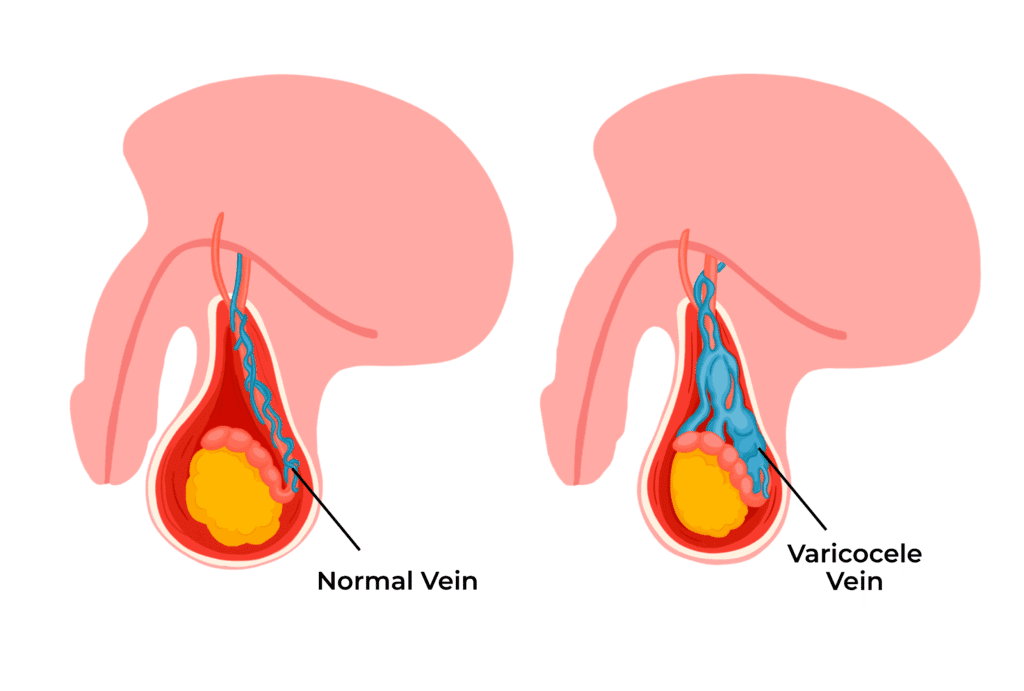The Truth About Varicoceles and Male Fertility
A varicocele is essentially a dilated swollen vein also called varicose vein, but located within the scrotum. This enlargement of the veins inside the spermatic cord, the structure that holds the testicles is a relatively common condition. For men actively trying to conceive, the most pressing concern is whether this condition can lead to infertility.

Medical research confirms a strong association: a varicocele can, and often does, impact fertility, though it does not cause infertility in all men. To grasp this complex connection, we must look at the specific mechanisms through which a varicocele disrupts the delicate biological process of sperm production.
The Primary Mechanism: Thermal Stress and Blood Stasis
The core issue caused by a varicocele is a breakdown of the body’s natural temperature-regulating system for the testicles.
- Impaired Venous Drainage: The veins in the scrotum, known as the pampiniform plexus, are responsible for draining oxygen-depleted blood away from the testicles and back toward the heart. In a varicocele, the valves within these veins fail, causing the blood to flow backward and pool (stasis) within the scrotum.
- Elevated Scrotal Temperature: The testicles must be maintained a few degrees cooler than the core body temperature for optimal spermatogenesis (sperm production). The pooled blood from the body acts like a heat source, significantly raising the local temperature within the scrotum. This thermal stress is the leading theory for varicocele-related damage.
- Compromised Countercurrent Heat Exchange: Normally, the testicular veins help cool the arterial blood flowing into the testicles. The pooling of warm blood disrupts this countercurrent heat exchange system, leading to chronic overheating of the sperm-producing environment.
Direct Impact on Sperm and Hormones
The sustained thermal stress and poor circulation have cascading negative effects that damage the developing sperm cells. These effects are clearly visible when examining a semen analysis:
1. Sperm Production and Quality Decline
The elevated temperature is directly toxic to the cells responsible for creating and maturing sperm, leading to quantifiable deficiencies:
- Reduced Sperm Count (Oligospermia): The ability of the testicles to produce the necessary volume of sperm is impaired, resulting in a lower total sperm concentration.
- Impaired Motility: The sperm’s ability to swim with speed and direction is compromised. This decreased motility is critical, as sperm must travel a great distance to reach and fertilize an egg.
- Abnormal Morphology: The shape and structure of the sperm cells become defective. Poor morphology reduces the sperm’s functional capacity to penetrate and fertilize the egg.
2. Oxidative Stress and DNA Damage
The stagnant blood flow can also lead to an increase in harmful compounds known as Reactive Oxygen Species (ROS), or free radicals. This creates a state of oxidative stress, which is essentially cellular rust. Oxidative stress can damage the sperm’s membrane and, critically, cause DNA fragmentation within the sperm nucleus. High levels of sperm DNA damage can reduce fertilization rates and increase the risk of early pregnancy loss.
3. Endocrine (Hormonal) Dysfunction
The harsh microenvironment can also negatively affect the Leydig cells in the testicles, which are responsible for producing testosterone. The resulting reduction in testosterone levels can further impair sperm production and overall male reproductive function.
In essence, a varicocele disrupts the delicate balance required for healthy sperm, impacting the three main pillars of male fertility: Count, Motility, and Morphology.
When Varicocele Treatment is Recommended
Because not all varicoceles cause fertility problems, treatment is typically recommended when a man presents with three specific criteria:
- A diagnosed varicocele.
- An abnormal semen analysis (low count, motility, or morphology).
- The couple is experiencing difficulty conceiving (infertility).
For these individuals, repairing the varicocele, often through a minimally invasive procedure like embolization, can normalize the testicular temperature and blood flow, leading to measurable improvements in sperm health within a few months and potentially increasing the chances of natural conception.
Don’t let varicocele affect your health and fertility. With advanced, minimally invasive treatments, relief is closer than you think. Book your consultation with our specialists today and take charge of your health.






